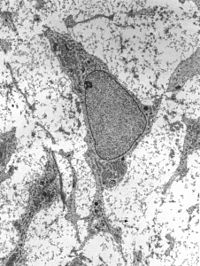
Photo from wikipedia
BACKGROUND Stem/progenitor cells from human exfoliated deciduous teeth (SHED) show remarkable pluripotency, regeneration and immunological capacities. During in-vivo regenerative events, SHED could crosstalk with the surrounding inflammatory microenvironment, through toll-like-receptors… Click to show full abstract
BACKGROUND Stem/progenitor cells from human exfoliated deciduous teeth (SHED) show remarkable pluripotency, regeneration and immunological capacities. During in-vivo regenerative events, SHED could crosstalk with the surrounding inflammatory microenvironment, through toll-like-receptors (TLRs). AIM The current investigation depicts a characteristic TLRs' profile for SHED for the first time. DESIGN Cells were obtained from extracted deciduous teeth (n=10), anti-STRO-1 immunomagnetically sorted and cultivated, forming colony forming units (CFUs). SHED were inspected for mesenchymal stem/progenitor cells traits, including the expression of the clusters of differentiation (CDs) 14, 34, 45, 73, 90, 105 and 146, and their multilineage differentiation aptitude. TLRs 1-10 expression was investigated for SHED in uninflamed and inflamed (25ng/ml IL-1β, 103 U/ml IFN-γ, 50ng/ml TNF-α and 3×103 U/ml IFN-α; SHED-i) micro-environmental conditions. RESULTS SHED were negative for CDs 14, 34, 45, while positive for CDs 73, 90, 105 and 146, and demonstrated characteristic multilineage differentiation. In uninflamed microenvironment, SHED expressed TLRs 1, 2, 3, 4, 6, 8, 9 and 10. The inflammatory micro-environment downregulated TLR7 significantly on gene level and upregulated TLR8 on gene and protein levels (p<0.05; Wilcoxon-signed-rank-test). CONCLUSION Within the present study's limitation, a unique TLRs expression profile for SHED is outlined for the first time, which could modulate their immunological and regenerative abilities during oral tissue engineering approaches.
Journal Title: International journal of paediatric dentistry
Year Published: 2023
Link to full text (if available)
Share on Social Media: Sign Up to like & get
recommendations!